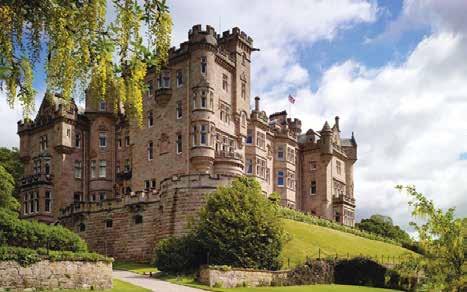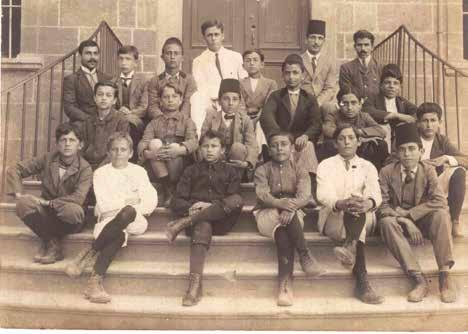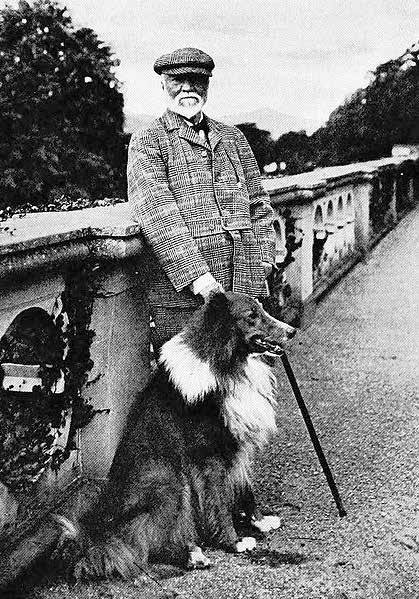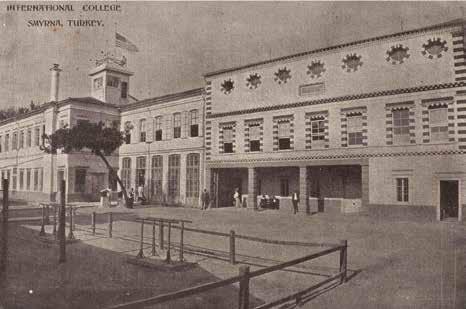
5 minute read
The Adventures of Alexander MacLachlan Part V
The Adventures of Alexander MacLachlan:
Like a “mighty wind that blew,” as Protestant MinisterAlexander MacLachlan said, the Kennedys came into his life and became his friends and supporters for the next 37 years. Thanks to their generous donations, the school expanded and thrived. Meanwhile, and for the fourth time since its establishment in 1891, the ‘Collegiate Institute’ changed its name. This would mark its last time. In 1903, ‘International College’ proudly entered the second decade of its history…
The news couldn’t be worse for MacLachlan. Turkish authorities had just informed him to evacuate one of the leased buildings of the school. It appeared that the landlord found a buyer for the property and according to Turkish law, sale of property took precedence over a lease.
This would effectively downsize the school considerably. It would mean that MacLachlan would have to dismiss a large number of students. Not one to take direct orders, the Protestant minister threw himself into researching and finding a loophole in Turkish law. He found it: Turkish law also granted the tenant the right to purchase the property. The price was set at £1200. MacLachlan put in his personal savings which amounted to £500. He appealed to the US Board in Boston for the rest. He was refused. He sent other letters of appeals and received no answer. Just as he was beginning to despair, he received a small note from a friend. “Why not appeal to some of your Presbyterian friends?” it said. “Of course”, MacLachlan thought to himself. He had many Protestant friends right here in Smyrna. Among them was a British friend who had been following the progress of International College with great interest. The friend immediately came to the rescue and supplied the needed £700. “I am putting it at your disposal,” he told the relieved MacLachlan “to help the College out of this almost impossible situation.”
The sale went smoothly enough but the experience left MacLachlan anxious. He couldn’t rely on the US board. That had become clear. He had to find his own source of funding. One day he heard that Andrew Carnegie, a Scottish-American industrialist who led the enormous expansion of the American steel industry in the late 19th century and one of the most important philanthropists of the time, was seeking worthy causes to dispose of his great wealth. MacLachlan felt certain that Carnegie would be sure to choose his humble school in Smyrna. Friends tried to dissuade him. Even John S. Kennedy, now a staunch friend of IC, wrote and discouraged him but nevertheless included an introductory letter to Carnegie. By now, even the Kennedys realized that very little could dissuade MacLachlan once he got hold of an idea.
For his part, Carnegie had purchased a 12th century castle, “Skibo”, a few years earlier in the Highland county of Sutherland, Scotland. He had just spent over £2m in modernizing the crumbling castle and was immensely proud to take on the new role of a Scottish laird. (Today, the castle is an exclusive £1000 a night members -only hotel and country club)
It was to this castle that MacLachlan set his focus. If only Carnegie could hear out MacLachlan, then he was sure Carnegie would bequeath a sizeable donation to IC – thus ending all the school’s financial woes.
Funding the trip proved to be a challenge. Limited school and personal funds afforded him a third class ticket on a ship heading to Marseille. Not really befitting of a minister but, as MacLachlan put it, “a midsummer travel in the Mediterranean is quite as tolerable on the open deck as it is in a third class cabin below,” he wrote in his 1937 memoires, Potpourri of Sidelights and Shadows from Turkey.
A long slow train journey then brought him to the north-east coast of Scotland – still a few miles short of his destination. Since there was no public transportation in sight, MacLachlan doggedly set off on foot to reach the castle. It took him a few hours on the dusty road but he finally arrived.
Smyrna (Part V)
It was then that he saw it: a grand 100-room baronial castle with imposing towers, turrets and battlements set in the midst of 20,000 acres of gardens, rolling lawns, herbaceous borders, orchards, woodland walks, greenhouses, ponds and a waterfall. It was for Carnegie, his “heaven on earth.” The exhausted reverend was welcomed quite cordially to the castle and even invited to stay for a fortnight if he so wished. Guests at Skibo were treated like royalty. They fished for salmon in Carnegie’s streams, swam in his pool, and played golf on the course that Carnegie had carved down by the sea. And each morning at 8:00am, a kilted piper woke everyone up by playing bagpipes under the bedroom windows. The morning meal was served in the breakfast room off the main entrance hall, accompanied by Bach and Haydn pieces played on the huge pipe organ. On the first visit, each guest would be given a spoon embossed with “Skibo” in silver lettering – after finishing their breakfast. Visitors included King Edward VII, British Prime Minister LLoyd George, Booker T. Washington, Kipling, Polish Prime Minister Paderewski, the Rockefellers, and even Helen Keller. But the Protestant minister had no intention of reveling in this luxurious castle with its silk walls and velvet sofas. His beloved school back home needed him and the funds he had set out for.

On his second day at Skibo, he was accorded an interview with Carnegie. It was apparently a long interview (unfortunately, MacLachlan never revealed the details) but the end result was that MacLachlan was refused any financial help. “My visit was barren of any financial gain to the College,” he wrote in his memoires in an obviously sad tone. road leading him to the train station.


MacLachlan would do anything to keep the school going for these boys
It was a “fool’s errand” – as he called it. Still, he did manage to get something out of it: the story of his long, lone journey stirred the heart of a Scottish Christian philanthropist who ended up sending the school a generous check of a few hundred dollars.
To be continued ….
Historical information based on: an interview with Dr. Howard Reed (summer 2011); Potpourri of Sidelights and Shadows from Turkey, by Alexander MacLachlan, 1937; Carnegie’s summer home returns to glory days, Sunday July 14 2002, (David Bear) Travel magazine.










